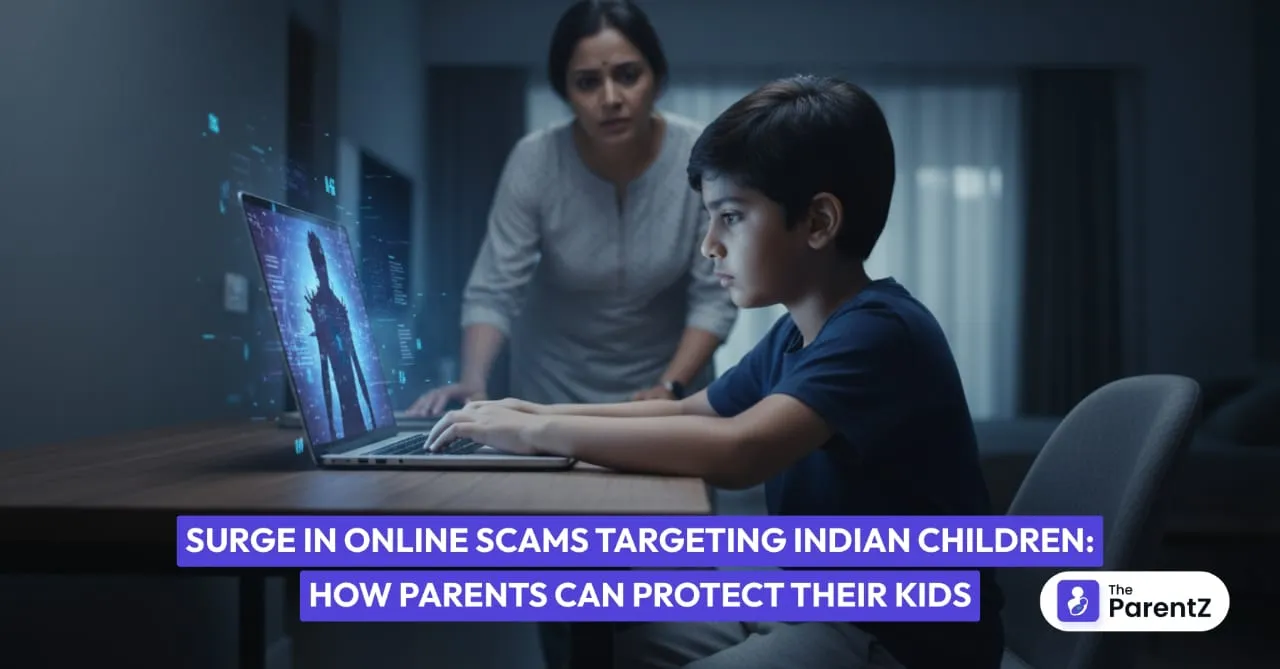You're making tea when your 14-year-old walks in looking pale. Their phone is shaking in their hands. A stranger just told them they're in trouble with the police. They need to send money right now or face arrest. Your heart stops.
This isn't a scene from a movie. This is happening to thousands of Indian families right now.
The internet has become both a playground and a minefield for our kids. While they're learning, connecting, and having fun online, there's a whole army of scammers waiting to exploit them. And they're getting smarter every single day.
If you're reading this thinking, "This won't happen to my child," we get it. But let us be honest, it can. The good news? You can protect them. But first, you need to know what you're up against.
The Scary New Scams Every Parent Should Know About
1. The Digital Arrest Scam: The Fake Police Threat
Imagine getting a call from someone claiming to be a police officer. They say your child has been involved in illegal activities. They're going to arrest them unless you transfer money immediately.
The number of digital arrest fraud cases nearly tripled between 2022 and 2024, and these scammers are specifically targeting young people now.
Here's how it works:
A scammer contacts your child through a video call, pretending to be a police officer, investigator, or judge. The victim is tricked into remaining under constant visual surveillance via Skype or other video conferencing platforms until the criminals' demands are met. Scammers send fake documents, fake videos, or doctored arrest warrants to make the claim appear real.
The threat? Your child's bank account will be frozen. Their passport will be cancelled. Their parents will find out. Everything feels real because the scammer uses fake police badges, official-looking documents, and keeps your child on camera.
Kids panic. And scared kids make bad decisions.
2. The Fake Letter Scam: False Accusations That Feel Real
Fraudsters are sending emails that contain a letter as an attachment, which makes allegations of child pornography, pedophilia, cyber pornography, sexually explicit exhibits, grooming, etc., levelled against the recipients of the said emails.
Your child receives an email. It looks official. It says they've been caught doing something illegal. It accuses them of serious crimes. It threatens legal action. It demands money to make it go away.
Your child is terrified. They don't know what to do. Many kids don't tell their parents because they're too scared or ashamed.
3. Online Grooming and Sextortion: The Predator in the Friend Group
This scam works differently, but it's equally dangerous.
A scammer creates a fake profile on Instagram, TikTok, or gaming platforms. They befriend your child. They seem cool, understanding, and interested in them. They slowly build trust over weeks or months.
Then, they ask for photos or videos. Sometimes they claim to need proof of age. Sometimes, they just convince the child through emotional manipulation.
Once they have the content, they threaten to send it to the child's parents, friends, and school unless money is paid. The blackmail never stops as scammers keep demanding more money because they know it works.
4. The Fake Child Modeling Scam
Parents dream of seeing their kids succeed. Scammers know this.
Starry-eyed parents wanting their kids to be the face of big brands are being scammed through a maze of Facebook ads, Telegram groups, scammers sitting abroad, and their money mules in India.
The promise? Your child could be a model for a big brand. All you need to do is pay a registration fee, a portfolio fee, and a shooting fee. By the time you realize it's fake, hundreds or thousands of rupees are gone, and your child never gets anything in return.
5. The Gaming and Prize Scam
Your child loves gaming. A message pops up: "Congratulations! You've won a prize!" All they need to do is click a link or provide personal information to claim it.
These scams collect personal data that can be used for identity theft, or they lead to malware infections that compromise your entire family's online security.
Why Are Kids Such Easy Targets?
Kids aren't stupid. Scammers are just really, really good at what they do.
Kids are vulnerable because they:
- Trust too easily: They believe adults online are who they say they are. A 13-year-old doesn't have the life experience to spot a lie.
- Fear authority: When someone pretending to be the police gets on a video call, kids panic. Fear makes them forget to think clearly.
- Care about their reputation: When threatened with exposure, they'll do almost anything to keep it quiet.
- Are impulsive: Their brains are still developing. They haven't learned that too-good-to-be-true offers usually are.
- Feel alone: They think they're the only ones this has happened to, so they don't tell anyone.
What You Actually Need to Teach Your Child
Teach Them: "This Could Be Fake"
Show them examples. Teach them that people online might not be who they claim to be. A profile picture of a cool kid might actually be a scammer using a photo from Google Images.
Play detective together. When your child finds someone new online, ask questions: "Do you know this person in real life? Where did you meet them? Why are they messaging you?"
Teach Them About Secrets and Safety
Tell your child: "Real police officers will come to our house. They won't call you on Skype asking for money. That's always a scam."
Teach them that if someone asks them to keep a secret from you, that's a red flag. Adults who are safe won't ask your child to hide things from their parents.
Teach Them to Never Send Photos or Videos
This is non-negotiable. No private photos. No videos. To anyone. Ever. Not to people they met online. Not to "friends", they've never met in person.
Tell them: "Once you send it, you can't get it back. Even if you trust someone, they could lose their phone, get hacked, or turn out to be a bad person."
Teach Them What to Do When Something Feels Wrong
If someone asks them to keep secrets, asks for photos, threatens them, or claims they're in trouble, they should:
- Stop talking to the person immediately
- Tell you right away (not their friend; tell you)
- Save the messages or take screenshots (so you can report them)
- Block the person
Promise them: "You won't get in trouble. I won't be angry. I just want to keep you safe."
Conclusion
Your child is growing up in a world you didn't. The internet is part of their life. You can't (and shouldn't) keep them off it completely.
But you can teach them to be smart. You can be present. You can listen without judgment. You can create a home where they trust you enough to tell you when something scary happens.
The scammers are getting smarter, but you can be smarter. And your child can learn to protect themselves. Start the conversation today. Your child's safety depends on it.





Be the first one to comment on this story.